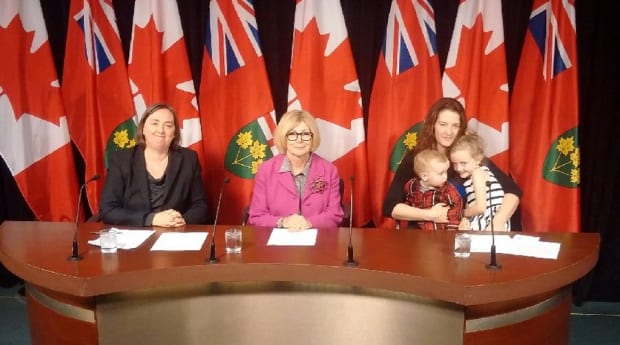The scariest moment for Kirsti Mathers McHenry came when her wife Jennifer was giving birth to their first child.
It was a difficult labour and Kirsti seriously worried that Jennifer might die. But on top of the anguish of potentially losing her wife, another thought was blasting through her head: Will I have any legal right to my daughter?
That’s because in Ontario, the law still treats same-sex couples differently than heterosexual couples when it comes to parenting. If a couple uses a sperm donor whose identity they know, the same-sex partner of the person giving birth isn’t automatically considered a parent.
“You just find yourself in limbo and you’re not really sure what that lack of recognition is going to mean of your child or your family if something was to happen,” Jennifer says.
Kirsti and Jennifer are the driving forces behind Cy and Ruby’s Act, a bill in the Ontario legislature that would give same-sex and multiple-parent families the same presumption of parentage afforded to heterosexual couples when a child is born.
The bill, which is named after their two children, is sponsored by Cheri DiNovo, the NDP MPP for Parkdale-High Park.
With four law degrees between the two of them, Jennifer and Kirsti knew the legal hurdles they would be facing when they decided to have children — a luxury most new parents don’t have.
“What I don’t think we totally appreciated was the degree to which that would have an impact on our day-to-day lives,” says Jennifer.
Kristi recalls the first time she had to take Ruby, their first-born child, to the doctor. It was immediately after Jennifer had given birth.
When she spoke with the doctor, it soon became clear that the she thought Kirsti had just given birth.
When Kirsti told the doctor that she hadn’t given birth, the doctor insisted they would have to wait for the mother to arrive.
“And I said, ‘I am the mother,’ and she said, ‘No, we have to wait for the mother,’” Kirsti says. “It was the use of the word ‘the,’ this certainty that people have that there could only be one mother.
“The difficulty for us at that point is that we knew legally she wasn’t wrong,” Jennifer says. “So you can’t really push back on those decisions in those circumstances.”
After each of their children was born, Kirsti and Jennifer had to go through a long, expensive and sometimes humiliating process to get the law to recognize Kirsti as a parent.
This included seeing a lawyer, getting their sperm donor to see a lawyer, signing affidavits and going to court to see a judge.
The couple found the trip to the court especially painful.
“Suddenly someone had this power to say no, you’re actually not a family and we’re not going to acknowledge you,” Jennifer says.
The judge approved their declaration of parentage and wanted to celebrate the decision with the couple.
But for Kirsti and Jennifer, it didn’t feel like a cause for celebration.
“It was a very concrete moment where the law was discriminating against us as opposed to facilitating something joyous and wonderful,” Jennifer says.
It was only after Kirsti and Jennifer had their second child, Cy — and Kirsti was denied federal parental benefits — that they decided it was up to them to try and change the law.
“That to me was really a moment where it became clear we had to do something,” Kirsti says. “Families can’t have that happen.”
They reached out to Peter Tabuns, their MPP, who helped them draft legislation and put them in touch with DiNovo.
According to Jennifer and Kirsti, they have heard support from the NDP caucus and Bob Bailey, a Conservative MPP, but have yet to hear any assurances from Liberal MPPs.
While DiNovo tells Daily Xtra that she expects all parties to support the bill, she does worry that it could get stuck in committee.
“This is obvious, everybody agrees it’s obvious, so let’s just get it done,” DiNovo says.
Jennifer says that their five-year-old daughter Ruby knows all about the bill.
“If you ask her, she will tell you that she is famous because her name is on a law,” Jennifer says. “She can explain to you the fact that the law didn’t acknowledge her family automatically and that that’s clearly wrong.”
“I’m really proud that their names are on it,” Kirsti says.

 Why you can trust Xtra
Why you can trust Xtra


